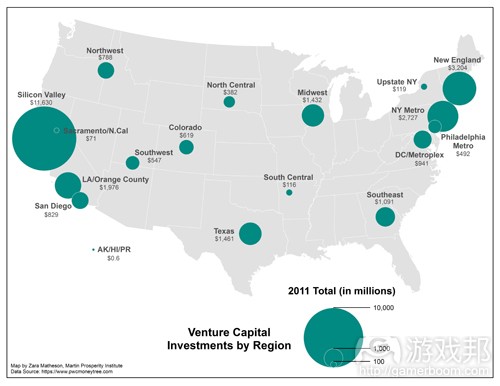开发者寻找VC需重视的人际关系技巧
作者:Seth Sivak
免责声明:本文只是我的个人经验和观点。当然还有其他方法,请把本文提出的建议当作你的工具箱中的又一个工具,而不是唯一的工具。(请点此处阅读本系列上篇文章)
人际关系综述
在这个行业,人脉是非常重要的;我想应该不会有人否认这个事实。说到让投资商出钱,人际关系就更重要了。与营销游戏一样,你见过的投资者越多,且与越多有兴趣的投资者建立关系,越好。我认为人际关系的发展可以分为两个基本的阶段:建立人际关系和培养人际关系。
建立人际关系
为了成功地与风投合作,你必须积累非常多对你有兴趣的投资者。风投给不给你钱取决于很多因素,所以必须认真考虑与风投建立关系。你认识的投资者越多,你的工作室可重点突破的潜在投资者就越多。
建立人际关系的最好办法是,不断地推销自己和认识其他人。每一次你游说某人,务必问他们是否认识其他可能有兴趣的人。当你见到“可能有兴趣的人”时,不要忘了再问同样的问题。
万事开头难,以下有几个建议人际关系的渠道:
聚会(新工作室聚会)
合作营/孵化器
在线社区
游戏节/比赛(Hackathons/Game Jams/Demo Days)
行业大会(GDC、Casual Connect)
Linkedin Groups (Video Game Financing)
Twitter (Twitter List)
取决于公司所在地,为了建立人际关系,你可能得四处奔波。比如,上图是美国的投资市场的分布。
培养人际关系
拿到名片或邮箱地址还不够。一旦有人表示有兴趣跟你联系,你的最终目标就是把对方转化成你的“倡导者”。为此,你必须有对方愿意跟进的项目或计划,然后想法让他们参与和投资。
把投资者转化成你的倡导者的最好办法是,首先谦虚地介绍你的公司和产品,然后问他们反馈。风投商通常愿意发表他们的观点,我觉得这是一个估计对方对公司和介绍的兴趣的好办法。一旦对方给出反馈,他们就对结果有所投入了,这段关系就有了继续成长的可能。不要低估了这些面对面交流的价值。
游戏行业的竞争是非常激烈的,保持与关键合作方、媒体或其他工作室的联系是非常重要的。我不是说你应该见谁就发名片,而是说,维持有价值的联系是必须的。我主张双向选择性介绍(游戏邦注:即在双方互不认识的情况下,先询问对方确认对方愿意认识你后再介绍自己),这么做效果不错。每次你见到新人时,请考虑你的其他人际关系,然后建立联系。
提醒
滥用人际关系的方系很多。大部分人都可以感觉得出来对方是否在玩笑他们的人际关系。不要那么做。你要真诚、诚恳,永远不要玩弄诡计。你的人际关系网反映了你的名誉,这对于潜在投资者来说是至关重要的。
总结
当风投来找你时,每一个被你转化为信徒的人都像是积极的介绍信,所以你总是要注意你如何宣传你的理念。归根到底,建立和培养人际关系应该当成寻找投资的一部分,因为建立强大的人际网是获得投资的最好办法。
一旦你建立起强大的人际网,你就可以开始游说项目了。这个话题我将在本系列的第三部分中介绍。(本文为游戏邦/gamerboom.com编译,拒绝任何不保留版权的转载,如需转载请联系:游戏邦)
Raising Venture Capital for Mobile Games – Part 2
by Seth Sivak
Part 2 of this series will focus on the importance of networking. Part 1 is about the basics of Venture Capital, and you can read it here.
Disclaimer: This is my experience and my opinion. There are certainly other ways to go about this process; think of this advice as just another tool in the toolbox, not the only tool for the job.
Networking Overview
Networking is important in this industry; I don’t think there are many people who would argue otherwise. When talking about raising money from investors, though, it becomes vital. Just like marketing a game, pitching investors is a campaign that benefits from sheer volume of investors seeing the pitch and then building relationships with those investors that show interest. I consider networking in this sense to have two basic parts: growing your network and then cultivating it.
Growing Your Network
In order to successfully work with VC funding, it’s necessary to have a large pool of interested investors. There are numerous factors that can go into a venture capital deal, so it’s beneficial to treat raising this sort of investment like it’s a campaign. The more people who see your pitch, the more potential investors your studio is apt to acquire.
The best way to grow your network is to constantly be looking for ways to extend yourself and meet new people. Every time you pitch to someone, ask them if they know anyone else who might be interested. When you follow-up with them, be sure to ask again.
Getting started can be difficult, but here are some resources:
● Meetups (Startup Meetups)
● Co-working Spaces / Incubators (Y Combinator, TechStars)
● Online Communities (Angel List, Hacker News, Quora)
● Hackathons / Game Jams / Demo Days (Hackathon.io)
● Conferences (GDC, Casual Connect)
● Linkedin Groups (Video Game Financing)
● Twitter (Twitter List)
Depending on the location of the company, it may be necessary to travel to help grow your network. The map above can give you a good indication of the investment market in your area.
Cultivating Your Network
Getting a business card or an email address is not enough. Once someone shows interest in connecting with you, your ultimate goal is to convert him or her into a believer. To pull this off, it’s essential for you to have a cause or vision that other people will want to get behind, and find a way to get them involved and invested in the outcome.
The best way to convert someone into a believer is to start by humbly presenting your company and game and asking for feedback. VC investors are usually open to sharing their opinion and I found this to be a good way to gauge interest in our company and mission. Once someone has given feedback, they will have some stake in the outcome, and that relationship can continue to grow. Do not underestimate the value of these face-to-face meetings.
The game industry is a competitive place and it may seem like a good idea to be protective of valuable contacts at key partners, press outlets, or other studios—but that’s not so. I’m not saying you should hand out introductions to anyone and everyone, but I do think it’s a good idea to foster valuable connections. Whenever possible, I favor a double-opt in introduction, and it has produced great results. Each time you meet someone new, consider the rest of your network and try to make connections.
A Warning
There are many ways to become “that guy” or “that girl” by abusing your network. Most people can smell when someone is trying to “game” their network or event. Don’t do that. Be genuine, honest, and helpful, and it will go much further than any Machiavellian strategy. Your network will reflect your reputation, and that is critically important to potential investors.
Conclusion
Each person that you convert to a believer will be a positive reference when other VCs ask about you (and they will), so it’s always a good idea to be mindful of how you preach your vision. At the end of the day, networking should be considered a part of getting your game funded, because building a strong network is the best way to secure investments.
Once you have built up momentum with your network it is time to start pitching. That will be the topic for Part 3.(source:gamasutra)
下一篇:举例分析游戏难度的设计要求








































 闽公网安备35020302001549号
闽公网安备35020302001549号